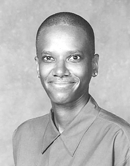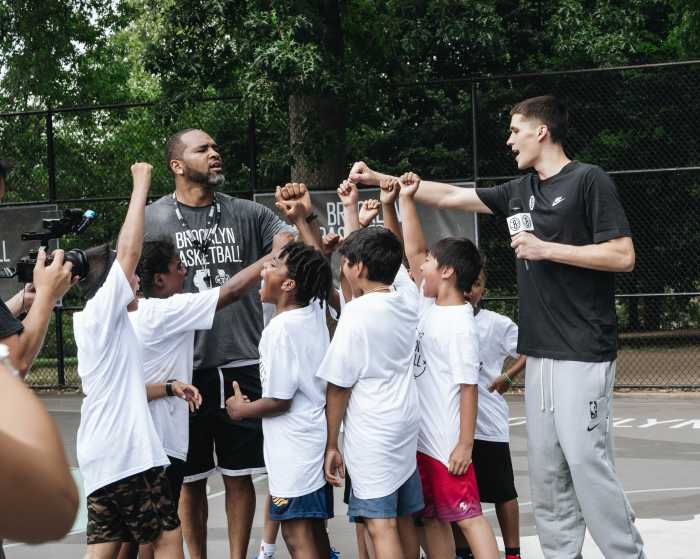With other gay New Yorkers, Log Cabin vows to fight any state anti-gay marriage amendment
Just like many of their peers, gay Republicans were stunned by the overwhelming support for the anti-gay marriage initiatives that voters in 11 states approved on November 2.
The results “sent a very difficult message to many of us,” said Tom Wahl, Jr., New York State chairman of the Log Cabin Republicans (LCR) and the group’s national treasurer.
For the gay Republican group, those votes followed their own party endorsing a national platform that called for banning gay marriage as well as civil unions and domestic partnerships.
Earlier in 2004, Pres. George W. Bush announced his support for an amendment to the U.S. Constitution that would ban gay marriage. LCR later declined to endorse the president in his reelection bid.
It was a tough year for the entire gay community, but perhaps toughest of all for its Republicans. They are soldiering on. LCR said its membership grew after it announced that it was withholding its endorsement in early September and some of that growth is in New York.
“We have, in the national organization, only four or five state organizations,” Wahl said.
With roughly 1,000 members, New York is one of those states.
The group has established chapters in New York City, Hudson Valley and in the Rochester-Finger Lakes area. There are chapters “in formation” on Long Island and in the Albany-Saratoga region, according to Wahl.
For a brief period, the state organization employed Jeffrey K. Cook as its state political director, but he has moved to the national office in Washington, DC. Wahl said the state chapter may hire another political director, but “probably not immediately.”
Log Cabin Republicans of New York will be focusing its energy on a number of initiatives in the state with a primary effort on stopping any anti-gay marriage legislation in Albany.
“Our number one sensitivity this year is DOMA,” Wahl said referring to the federal Defense of Marriage Act. “We obviously would like to see some type of civil union or civil marriage, but we have to make sure that the Legislature backs away from any type of DOMA legislation.”
The gay Republicans do not have the money of an Empire State Pride Agenda (ESPA), the statewide gay lobbying group, but its members are going to reach out to their state elected officials.
“We are not blessed with the capital resources of ESPA,” Wahl said. “We are going to have members from across the state take ownership of their state legislators.”
In some parts of the state, LCR has established relationships with elected officials.
“We are in a position right now where legislators actually come to us when they have a question about lesbian or gay issues,” said Ingrid E. Barnes, vice president of the Hudson Valley chapter and a state board member. In other areas, LCR hopes to create new relationships.
“When it comes down to it we really want to educate everyone,” Barnes said. “That’s really the bottom line. It’s about education.”
Education can be very effective with some legislators, according to Wahl.
“It’s incredible to see how quickly you can move some of these people to be accepting and understanding,” he said. “I think when you get down to it, most politicians realize that gays and lesbians are as productive as any member of the straight community.”
Patrick M. Murphy, president of the New York City chapter and a national board member, said it was “unlikely” that an anti-gay marriage bill would pass in New York, but emphasized that their efforts were aimed at “making sure DOMA doesn’t even come up and we would like some incremental movement on civil unions or other ways of protecting our families…We have some Republicans in the state who are representing us…That is part of our role, to lobby those people.”
The lopsided results on November 2 also made clear that the community must also win more allies. These could include “straight constituents” and “moderate Republicans who believe in fairness,” Wahl said.
Its conservative members wrote the national Republican Party platform, which was not necessarily embraced by all Republicans.
“There were many, many frustrated Republican delegates who did not buy into the platform,” Wahl said.
The community faces an inherent disadvantage in persuading potential allies. Discussing the benefits of gay marriage is a “half hour conversation,” according to Murphy.
The con side can be communicated in a single phrase.
“The term protecting marriage was a brilliant term,” Murphy said. “Who could be against protecting marriage? We have to remember, whether we like it or not, we are in a persuasion game.”
For Barnes, one of the lessons of November 2 was that the gay community must speak plainly to its friends.
“I think the lesson is that we need to have a much clearer dialogue with people who support us,” she said. “I don’t think we had a very clear dialogue with people who support us.”
Murphy has been making the rounds of New York City town meetings where he has made the point that the community must rack up some wins after the November 2 results.
“We’re going to be discussing that,” Murphy said. Clearly, we are going to be discussing wins…We’ve got to keep pushing this on many fronts other than marriage.”
What a win would look like in New York is not clear. The State Legislature may not ban gay marriage, but it is just as unlikely to approve it. It is possible that New York might enact civil unions, an arrangement regarded by many as having limited benefit and not likely to be recognized by any other state or the federal government.
“From a perception point of view, it would be wonderful, but from a federal point of view how receptive would the federal government be?” Wahl said.
But the gain in the perception game could aid the community in the long run.
“A lot of this work is incremental work,” Barnes said. “If we do manage to get something done on the state level it can only help our cause.”
We also publish:



































